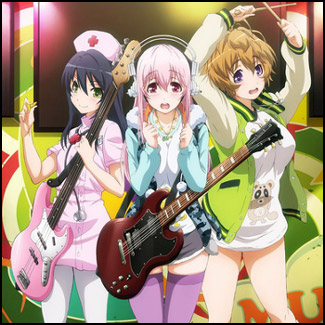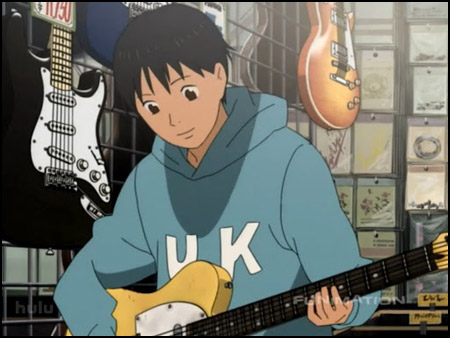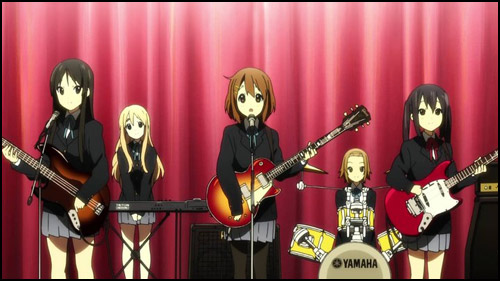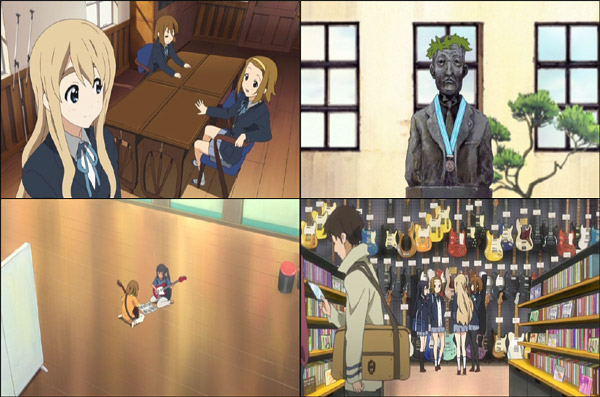The Mike Toole Show
The Musical Suspects
by Michael Toole,
It wasn't until the second or third episode that I realized what was bothering me about Super Sonico: The Animation. Yes, I watched all twelve episodes of that fanservice-laden snoozer, and I'm not sorry. I'll explain why in the coming paragraphs. But what I kept noticing was the opening song, and the way it depicts the headphones-wearing title character and her band, in the throes of performing. (Sonico players a Gibson SG, like Tony Iommi of Black Sabbath, but her band's a power trio, like Sleater Kinney.) But the title song doesn't seem to feature any of the instruments depicted – it's strictly a drum machines, synth, n’ autotune affair.
Anime's relationship with music isn't so different from what we've seen over the years in western animation. Like Disney's Fantasia, there are films largely set to music – Masami Hata's Yōsei Florence, Takashi Yanase's Metamorphoses – and there are shows that use music and performing as a catalyst, like Macross 7 and NANA. Some anime is particularly about music and about being in a band – think The Commitments, only with cuter girls and without all the drinking and swearing. Perhaps my favorite example of this subject is the obscure OVA To-Y, but as usual, Justin's got that one covered. I'll just have to focus on the cute girls.

On first glance, it doesn't look like there's much to SoniAni: Super Sonico the Animation. It's a TV series based on a Nitroplus mascot character created by illustrator Santa Tsuji, who favors moony-eyed girls with gravity-defying proportions. His illustrations led to figurines and other character goods, and soon there was manga, video games, and an entire fictional backstory for Sonico, a bodacious, pink-haired ingénue who seems to have stylish headphones permanently grafted to the sides of her head. Sonico, it turns out, is a model, and a diligent college student. But she's also the lead singer of the band First Orbital Velocity, complete with singles that you can buy from Nitroplus: yep, more character goods. The eventual TV series was inevitable, and my first impression was that it was all surface; maybe not as crude as other fanservice shows, but still a show concerned mainly with skimpy outfits and improbably camera angles.
But something kept drawing me back to the show. Maybe it was the weirdly imaginative ending sequences, which feature a CG Sonico drifting through surreal landscapes. Maybe, as a buddy in Japan commented, it was the boobs. Maybe it was the peppy pop music, featuring the vocals of Ayano Yamamoto (the show credits the character's voice as “Super Sonico,” but I know that, like Santa Claus, the real Super Sonico exists in all of us). Ultimately, I was taken by how the show takes its fanservice as a given, and then sets it aside to focus on Sonico's surprisingly gentle, earnest stories. I was taking in what I'd soon learn was referred to as an iyashikei (癒し系) anime, a soothing, healing kind of show. There are plenty of healing anime, stuff like Hidamari Sketch, Kamichu!, and of course, JoJo's Bizarre Adventure.

But for all of its songs, SoniAni is kind of curiously unconcerned with the nuts and bolts of being in a band. Sonico gains a little hard-won fame by being forced to perform solo while her tardy bandmates make their way to the venue in one episode, sure, and another episode involves a scramble for some impromptu rehearsal space. But we rarely see Sonico practicing by herself, or tuning her instrument, or replacing those shit Rockfield pickups with something a little more active. That's the kind of storytelling I want, you know?
I think the only anime that's really given me that particular flavor of storytelling is Beck. Based on the long-running (and frustratingly, unfinished by the occasionally-alive TOKYOPOP) manga by Harold Sakushi, Beck is the high school band experience depicted in the realest way I've seen in the medium. Here, there's hasty meteoric rise to fame, or performance used as a minor plot device. Instead, we get a no-frills story about a kid who uses music to cope with bullying and feelings of alienation, and emerges into a wider world as a result. It's challenging to explain just how much Beck gets right; when protagonist Yukio gets his first guitar, it's almost a mystical experience for him, and he treats it like a precious holy relic. This connected with me, because I lived that stuff, too—like so many other kids, I played guitar in high school. (Naturally, Yukio ends up accidentally breaking the precious guitar. Yep, I did that too!)

There's an awkward sense of accomplishment in mastering even simple rock songs, which Yukio gradually does through the show's first arc. (As an aside, the original title Beck has been quietly shuffled off; the official DVD title is now just Mongolian Chop Squad. Did Beck Hansen object to the name? Did Jeff Beck object to the name? Did some other musician named Beck object to the name? Who knows?) He takes up with a band, who stumble through lineup changes, fumble with cheap, temperamental equipment, and doggedly practice and rehearse for the chance to play in front of a few dozen disinterested spectators. And then, for the entire group, things just start to come together. The series even has the requisite cute girl, Maho, though she swears a lot more than usual. SoniAni's songs are a bit cheap and facile, but the music of Beck is a bit more varied and textured. It's still hanging out over at Hulu, so if you're not locked out by an obnoxious geographic restriction, have a gander—and a listen.
Some weeks back, I was rapping with my anitwitter (“anitwitter” is the part of twitter where all the anime dorks hang out) pals. The great thing about Twitter is how very narrow discussions can suddenly become broad; one friend was disparaging Redline as a 2009 anime production that otaku ignored, and I wondered if there were any shows from 2009 that were still being discussed, period. Another pal glibly pointed out a couple of little-known 2009 productions called Monogatari and K-ON, and that got me wondering: was anyone really still talking about K-ON? I guess that makes this column a self-fulfilling prophecy.
Just how great was K-ON’s impact? Half a million blu-rays sold in Japan, for starters, and I don't think that even takes into account stuff like box-set re-releases. The series bolstered and complemented sales of the original manga by kakifly, and led to the usual avalanche of character goods like figurines, stationery, keychains, and more figurines. It further established its production studio, Kyoto Animation, as anime tastemakers—they'd previously scored with otaku favorites like Haruhi Suzumiya, Lucky Star, and Clannad, but K-ON made ripples beyond the otaku core. Its capstone was the feature film, which pulled in an eyebrow-raising $1.9 billion yen (around $20 million at the time). But at its core, K-ON is about a bunch of girls in a band together.
Yui Hirasawa literally stumbles into her school's light music club, an afterschool activity ostensibly devoted to playing lightweight pop tunes. The current members Ritsu (only joined so she could add “president of extracurricular club!” to her CV), Mio (badgered into joining by Ritsu), and Tsumugi (sweet-talked into joining by Ritsu) are desperate for a fourth, to prevent the nascent club from being dissolved. But while Ritsu plays drums (just like Keith Moon!), Mugi plays keyboard (just like Ray Manzarek!) and Mio plays bass and sings (just like Geddy Lee!), Yui doesn't play an instrument. It doesn't matter; she's convinced to join, and then more or less handed a Gibson Les Paul.

That little detail makes me roll my eyes a bit—after all, part of the fun of being in a high-school band is the cheap, awful student instruments! But as light as K-ON’s musical touch is at times, it's absolutely meticulous when it comes to gear, be it Mugi's KORG Triton keyboard or Ritsu's Rick Marrotta drum kit. And Yui, for her part, very quickly goes from staring down uncomprehendingly at her new instrument to sitting on the edge of her bed, practicing barre chords over and over and over. She takes to the guitar quickly, and her more established bandmates are impressed when she reveals that she tunes the guitar by ear and quickly notices even 16th-tone discrepancies.
The girls and their new band, Houkago Tea Time (they do have a tendency to eat snacks and chat instead of practicing) very quickly get good. It's a little too quickly, if you ask me—you want a new band of student musicians to be kind of gloriously rough around the edges, but this group literally never has that problem beyond a few wrong notes in the early going. Their songs are fun and catchy (particularly the gloriously-titled “My Love is a Stapler”) but seem weirdly polished. Instead of watching them painstakingly learn these songs, we follow the band through their daily lives, as their friendship and fellowship grows. Yep, this one's another healing show.
As much as I wanted to be disappointed by K-ON’s focus on characterization over the dynamics of playing live music, the show does something just as impressive: in a sea of blasé sitcoms often incorrectly described as “slice of life,” it gets both conventions right. In the short form, K-ON is a sitcom. It's based on gag manga, after all. But taken as a whole, as a complete work—whether you include just the 13-episode first season or the entire animated franchise—it's a slice of life, a rich and sugary tranche that starts with the formation of the light music club and stops, with just the right bit of halting awkwardness, when the characters graduate and move on with their lives. You can't point to a specific climactic moment, and we never really learn about what happens after graduation (unless you read the sequel manga, which I have not).
Yet, I still feel like there's a little something missing. The shy Mio writes most of the group's lyrics, but we never really learn about how she does it. I've known a few lyricists; the words pour from their minds like waterfalls, unceasingly. Where are Mio's notebooks full of them? Where's the bit where Ritsu taps her snare drum, listening to its tone suspiciously and compulsively tweaking the drum key after every strike? Does Mugi have a “default” chord sequence, a riff from a favorite tune that she plays constantly, like Peter Lorre whistling “Hall of the Mountain King” in M? Where's the episode in which Yui sits on her bed, coiled in a snake, listening to Lou Reed's Transformer, over and over and over again? She practices the windmill like Pete Townshend, but does she look up to female guitarist/singers, like Nancy Wilson or Naoko Yamano? Maybe my expectations for the series are a little too exacting and clear-cut.
Anime fans are quick to praise the aesthetic standards of Kyoto Animation, who established themselves as a top-line production studio with the shimmery, dreamlike Munto before moving on to more ambitious fare. It feels like KyoAni have always had very high standards, and they're one of a very small number of anime studios who retain a full-time staff of animators and don't work them into the ground. I think this approach pays off; I'm not sure I've seen a recent anime TV series so utterly consistently watchable on the visual level as K-ON. The show takes very few risks, granted, but just pulling a selection of frames at random from any particular episode is surprisingly evocative. I kind of have to wonder how series director Naoko Yamada and her staff do it—in a medium practically defined by cheap, weird visuals, they strike a very nice balance.

The girls of K-ON don't seem to have music constantly bubbling out of them like a lot of musicians I've met, but maybe that's for the best. The series does hit on a number of small moments of musical discovery—in particular, my favorite is the group taking a road trip to a music festival, which reminds me of hitting Lollapalooza as a kid—but maybe it doesn't have to be about the music. As tantalizing as the best musical bits are, the show really hits its stride when it's about those small moments of chemistry between the characters. We get one last strong dose of this in the franchise's final movie, which sells itself as a grand trip to London. There are some nice surprises in the film—we get a look at Yui's creative process, and the group's amusing struggles with the English language. But as Houkago Tea-Time spend the middle third of the film passing by the shops and pubs of London, all I kept thinking about was dumb jokes.

Maybe Ritsu can do this in the sequel. I know she's got it in her. Beck is much more vividly about music, but it's interesting to see how much in common K-ON has with it; it still uses some of the same building blocks. K-ON's got a reputation as a moe show, and that's certainly not undeserved—all five K-ON ladies (did I mention lead guitarist Azusa, who joined the band a bit later? Let's say she's the show's Jennifer Batten) are struck from the same cutie-pie mold as previous KyoAni gals like Clannad's Nagisa and Haruhi Suzumiya herself. But the show's got substance to back up its pretty faces, and some catchy songs too.
Do you like anime about music? Did watching stuff like Beck or K-ON make you want to start playing music? Were you charmed by Sonico's low-key stories, or weirded out by her conspicuous decolletage? Speak up in the comments! You know, I've still got a guitar, and I've been practicing, too. It's only a matter of time before I'll have learned and mastered Fuwa Fuwa Time, so look forward to my smash hit recording of it.
discuss this in the forum (43 posts) |